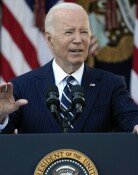Beware of ‘ultra-low yen’
Beware of ‘ultra-low yen’
Posted October. 20, 2022 07:54,
Updated October. 20, 2022 07:54
Plummeting value of the Japanese yen is raising concerns that it may trigger an economic slowdown across entire Asian currency markets. On Tuesday, the yen fell to 149 against the U.S. dollar before the closing of the day’s global currency market. This is the lowest in 32 years since August of 1990, during the later stage of the country’s “bubble economy.”
The steep decline of the yen’s value originated from the interest rate gap with the U.S. dollar. While the U.S. has pushed the interest rate to be in the 3.00-3.25 percent range, Japan is still not taking any stance but maintaining its de-facto zero rate. Failing to take any measure comes from the country’s immense interest cost incurred by its huge national debt amounting to 1,225 trillion Yen (approximately 10.2 quadrillion won). Furthermore, the prolonged economic slowdown has weakened the country’s financial resilience. Considering such circumstances, it is unlikely that the Japanese can find an immediate solution to turn the current tide.
The issue here is that the speed of the yen’s fall may have a butterfly effect on other Asian countries’ currency markets, including Korea. “King dollar” is already pushing money out of emerging markets. The declining value of the Chinese yuan on top of the low yen is highly likely to spread ‘weaker domestic currency against the dollar’ pheromone to the entire Asian markets. The decline of Thailand’s baht, which shook out the whole east Asia, was the starting point of the 1997 Asian Financial Crisis.
The Korean won is already the second fastest Asian currency falling against the dollar. Some forecast that the Korean won may drop to over 1,500 against the dollar. Korea’s export economy, a tool to defend the currency value, is struggling, the trade balance has been in red for six consecutive months, and the current balance turned negative in August. Furthermore, over 1,800 trillion won of household debt is a ticking bomb to the country.
To prepare for the potentially massive tsunami effect from the record-low yen, the situation of structural deficits in the current balance must be prevented. The country needs fast support for exporting companies and enhancement of the credibility in Korea’s stock and bond markets to stop capital flight. The experiences of Japan, where immense national debt restricts the ability to maneuver flexible moves for interest rate and currency policies, should work as a reference for Korea to avoid facing the same situation. As the International Monetary Fund already warned, Korean politics should be strongly wary of implementing generous policies, which spends budgets to get votes. Otherwise, it may end up bringing a currency crisis to themselves.







